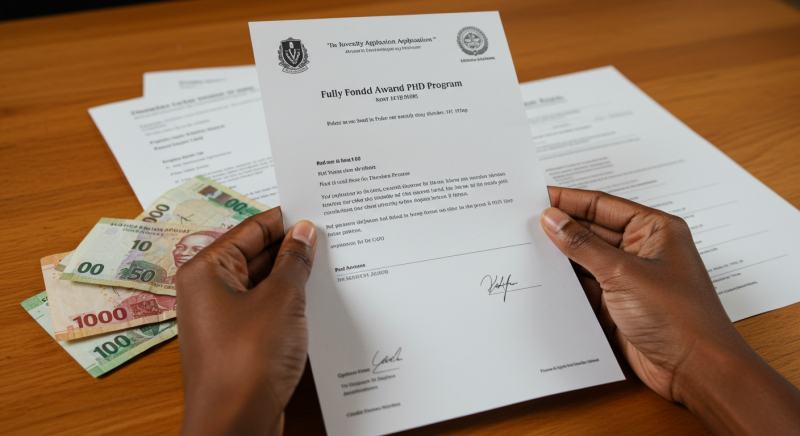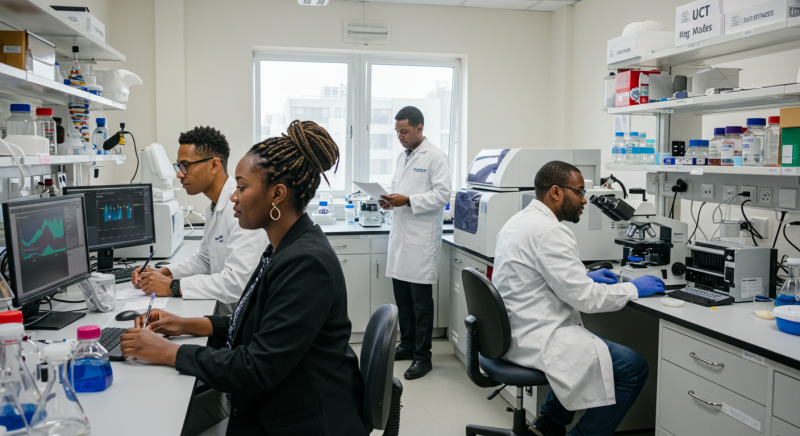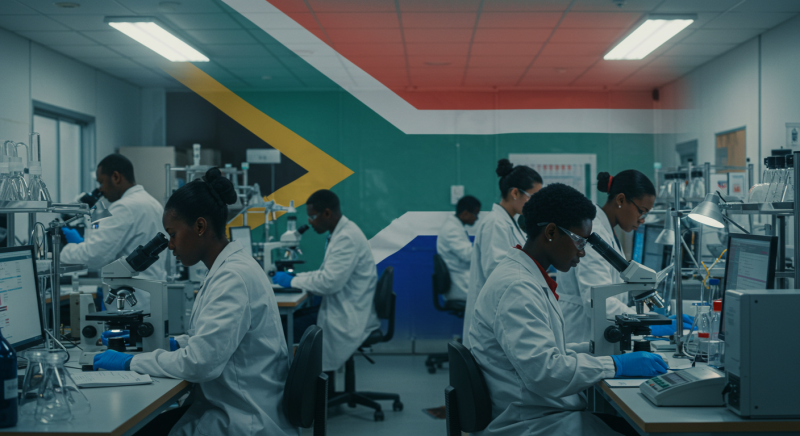The dream of pursuing doctoral studies often feels like an impossible mountain to climb, especially when financial constraints stand between you and your academic aspirations. For countless brilliant African minds, the thought of advancing their research careers through prestigious doctoral programs seems financially out of reach. However, South Africa has emerged as a beacon of hope, offering numerous fully funded PhD programs in South Africa for African researchers that can transform academic dreams into reality.
Imagine walking through the historic corridors of the University of Cape Town or conducting groundbreaking research at Stellenbosch University, knowing that every aspect of your doctoral journey is financially supported. This comprehensive guide reveals how African researchers can access these transformative opportunities, breaking down barriers that have traditionally limited academic advancement across the continent.
Key Takeaways
- Understanding fully funded PhD programs in South Africa for African researchers requires grasping several critical elements that can make or break your application success.
- These programs typically cover full tuition fees, provide monthly stipends for living expenses, offer research funding, and often include conference attendance support.
- The application process demands strategic planning, with most programs requiring applications 8-12 months before commencement.
- Success rates vary significantly based on research alignment, academic merit, and application quality, making preparation crucial for prospective candidates.
- How South African Universities Champion African Research Excellence

South Africa’s commitment to advancing African research capabilities stems from a deep understanding of the continent’s intellectual potential and the need for indigenous solutions to African challenges. The country’s leading institutions have recognized that fully funded PhD programs in South Africa for African researchers serve as catalysts for continental development, creating a generation of scholars equipped to address pressing socioeconomic, health, and environmental issues affecting African communities.
The historical context of this commitment cannot be overlooked. Following decades of academic isolation during apartheid, South African universities have embraced their role as continental leaders in higher education. This transformation has led to unprecedented investment in doctoral education, with universities allocating substantial resources to ensure that financial barriers do not prevent talented African researchers from pursuing their academic goals.
Stellenbosch University: A Pioneer in Doctoral Funding Excellence
Stellenbosch University stands as a testament to academic excellence and research innovation, offering some of the most comprehensive fully funded PhD programs in South Africa for African researchers. The institution’s commitment to continental scholarship is evident through its diverse funding mechanisms, which have supported hundreds of African doctoral candidates over the past decade.
The university’s Graduate School of Economic and Management Sciences (GEM) exemplifies this commitment through its Elite Doctoral Scholarships program. These prestigious awards provide R200,000 annually for three years, covering not only tuition fees but also providing substantial living allowances. The program specifically targets exceptional candidates from across Africa, recognizing that economic brilliance knows no geographical boundaries. More information about Stellenbosch University’s doctoral programs can be found at their official postgraduate portal.
Stellenbosch’s approach to fully funded PhD programs in South Africa for African researchers extends beyond financial support. The university provides comprehensive mentorship programs, research infrastructure access, and international collaboration opportunities. Their agricultural sciences department, for instance, has partnered with various African institutions to address food security challenges, creating research opportunities that directly benefit participating countries.
The application process at Stellenbosch requires careful attention to research alignment and academic preparation. Successful candidates typically demonstrate not only academic excellence but also a clear vision of how their research will contribute to African development. The university’s selection committees particularly value proposals that address continental challenges while maintaining international research standards.
University of Cape Town: Transforming African Academic Landscapes
The University of Cape Town (UCT) has established itself as Africa’s premier research institution, offering extensive fully funded PhD programs in South Africa for African researchers that have shaped academic discourse across multiple disciplines. UCT’s commitment to African scholarship is demonstrated through its comprehensive funding ecosystem, which includes merit-based awards, need-based support, and specialized research grants. Detailed information about UCT’s doctoral funding opportunities is available through their postgraduate funding office.
UCT’s postgraduate funding framework recognizes the diverse needs of African researchers, offering flexible support structures that accommodate different research timelines and requirements. The university’s Health Sciences faculty, for example, has developed specialized funding packages for researchers focusing on African health challenges, providing not only financial support but also access to state-of-the-art research facilities and international collaborative networks.
The institution’s approach to fully funded PhD programs in South Africa for African researchers emphasizes research impact and continental relevance. UCT actively seeks candidates whose research proposals demonstrate potential for addressing African challenges while contributing to global knowledge systems. This dual focus ensures that funded researchers become bridges between local needs and international academic communities.
UCT’s support extends beyond traditional financial assistance, encompassing career development programs, publication support, and post-doctoral transition guidance. The university recognizes that successful doctoral education requires holistic support, ensuring that African researchers are equipped not only to complete their degrees but also to become leaders in their respective fields.
Comprehensive Funding Opportunities Across South African Institutions
The landscape of fully funded PhD programs in South Africa for African researchers extends far beyond Stellenbosch and UCT, encompassing a diverse array of institutions and funding mechanisms. The University of the Witwatersrand, Rhodes University, and the University of KwaZulu-Natal have all developed robust doctoral funding programs specifically targeting African researchers.
The National Research Foundation (NRF) of South Africa plays a pivotal role in supporting these programs, providing substantial funding through various scholarship schemes. The DAAD-NRF In-Country Scholarship Programme represents a particularly significant opportunity, offering comprehensive support for African researchers pursuing doctoral studies within South Africa. This program combines German academic excellence with South African research infrastructure, creating unique opportunities for continental scholars. Complete details about NRF funding opportunities are accessible through their official scholarship portal.
Private sector partnerships have also expanded the scope of fully funded PhD programs in South Africa for African researchers. Companies like Anglo American, Sasol, and various mining corporations have established doctoral scholarship programs that align research objectives with industry needs while maintaining academic freedom. These partnerships create pathways for research that addresses both theoretical questions and practical applications relevant to African development.
International organizations have recognized South Africa’s potential as a hub for African doctoral education. The Carnegie Foundation, Ford Foundation, and various European funding agencies have established programs specifically supporting African researchers in South African institutions. These international partnerships have significantly expanded the pool of available funding while ensuring that research outcomes benefit the broader African academic community. The Carnegie Corporation of New York’s higher education initiatives in Africa can be explored at their dedicated Africa program page.

Strategic Application Approaches for Maximum Success
Securing positions in fully funded PhD programs in South Africa for African researchers requires strategic planning and meticulous preparation. The application process typically begins 12-18 months before intended commencement, requiring candidates to engage in extensive research proposal development, supervisor identification, and application material preparation.
Research proposal quality serves as the cornerstone of successful applications. South African institutions seek proposals that demonstrate clear understanding of relevant literature, methodological sophistication, and potential for significant contribution to knowledge. Successful applicants typically spend 6-12 months developing their proposals, engaging with potential supervisors, and refining their research objectives to align with institutional priorities.
Supervisor selection plays a crucial role in application success. Prospective candidates should invest substantial time in identifying supervisors whose research interests align with their proposed studies. This process involves reviewing faculty publications, attending virtual seminars, and establishing preliminary contact to gauge interest and compatibility. Strong supervisor support can significantly enhance application competitiveness.
Language proficiency represents another critical factor in fully funded PhD programs in South Africa for African researchers applications. While English serves as the primary medium of instruction, some programs may require additional language competencies depending on research focus. Candidates should assess language requirements early in their preparation process and seek necessary improvements through formal training or certification programs.
Financial Benefits and Comprehensive Support Systems
The financial packages associated with fully funded PhD programs in South Africa for African researchers extend far beyond basic tuition coverage, encompassing comprehensive support systems designed to ensure student success. Typical funding packages include full tuition fee coverage, monthly stipends ranging from R15,000 to R25,000, research funding for fieldwork and equipment, conference attendance support, and publication assistance.
Living costs in South Africa provide excellent value for doctoral students, with monthly stipends typically sufficient to cover accommodation, food, transportation, and basic recreational activities. Cities like Cape Town, Stellenbosch, and Johannesburg offer diverse accommodation options ranging from university residences to private apartments, allowing students to choose arrangements that suit their preferences and budgets.
Research funding components of these programs recognize the diverse needs of doctoral research across different disciplines. Science and engineering students may receive substantial equipment and laboratory access funding, while humanities and social science researchers typically receive support for fieldwork, archival research, and interview expenses. This flexibility ensures that research quality is not compromised by financial limitations.
Professional development support represents a significant additional benefit of fully funded PhD programs in South Africa for African researchers. Universities typically provide funding for conference presentations, workshop attendance, and short-term research visits to partner institutions. These opportunities enable students to build international networks, gain exposure to cutting-edge research, and establish themselves within their academic communities.
Research Excellence Opportunities and Continental Impact
Fully funded PhD programs in South Africa for African researchers create unprecedented opportunities for conducting research that addresses continental challenges while meeting international academic standards. South African institutions have invested heavily in research infrastructure, providing access to world-class laboratories, libraries, and computational resources that rival those found at leading global universities.
Interdisciplinary research opportunities represent a particular strength of South African doctoral programs. Universities actively encourage collaboration across departments and faculties, recognizing that complex African challenges require multidisciplinary approaches. Climate change research, for example, might involve collaboration between environmental sciences, economics, sociology, and policy studies departments, creating rich research environments that produce comprehensive solutions.
International collaboration networks established by South African institutions provide doctoral students with opportunities to engage with global research communities while maintaining focus on African applications. These partnerships facilitate student exchanges, joint research projects, and co-supervision arrangements that enhance research quality and international visibility.
The research impact of fully funded PhD programs in South Africa for African researchers extends far beyond individual degree completion. Graduates from these programs have gone on to establish research centers, influence policy development, and create innovative solutions to continental challenges. This multiplier effect justifies the substantial investment in doctoral education and demonstrates the programs’ long-term value for African development.
Application Timeline and Strategic Planning
Successfully securing admission to fully funded PhD programs in South Africa for African researchers requires careful attention to application timelines and strategic planning. Most programs operate on annual cycles with applications typically opening in April and closing between July and September for the following year’s intake. This timeline necessitates early preparation, with prospective candidates ideally beginning their preparation process 18-24 months before intended enrollment. The South African government’s official study portal provides comprehensive information about application procedures and requirements at Study South Africa.
The initial preparation phase should focus on research area identification and preliminary proposal development. Candidates should spend substantial time reviewing current literature, identifying research gaps, and developing preliminary research questions. This foundation work is crucial for subsequent supervisor identification and proposal refinement processes.
Supervisor contact and relationship building represent critical components of the application timeline. Prospective candidates should initiate contact with potential supervisors 12-15 months before applications are due, allowing sufficient time for relationship development and proposal refinement. Successful applicants typically engage in extensive correspondence with potential supervisors, receiving guidance on proposal development and institutional fit.
Documentation preparation requires careful attention to detail and adequate time allocation. Academic transcripts may require official translation and verification processes that can take several months. Recommendation letters should be requested well in advance, providing referees with sufficient time to prepare thoughtful and detailed endorsements. Language proficiency test scores may also be required, necessitating early registration and preparation.
Overcoming Common Application Challenges
Aspiring participants in fully funded PhD programs in South Africa for African researchers frequently encounter several predictable challenges that can be addressed through proper preparation and strategic thinking. Academic transcript evaluation represents one common hurdle, particularly for candidates from institutions with different grading systems or academic structures. Successful applicants typically work with credential evaluation services early in their preparation process, ensuring that their academic achievements are properly understood and valued by South African institutions.
Research proposal development often presents significant challenges for first-time doctoral applicants. Many candidates struggle with identifying appropriate research scope, developing methodological frameworks, and articulating potential contributions to knowledge. Successful applicants typically invest in proposal development workshops, seek mentorship from established researchers, and engage in iterative revision processes that refine their ideas over several months.
Financial planning beyond the provided funding represents another area where candidates often need guidance. While fully funded PhD programs in South Africa for African researchers provide comprehensive support, students may need additional resources for family support, emergency expenses, or specialized research activities. Successful candidates typically develop comprehensive financial plans that account for these additional needs and identify supplementary funding sources where necessary.
Cultural adaptation and academic system navigation can present challenges for international students. South African universities operate within specific academic cultures and administrative systems that may differ significantly from candidates’ home institutions. Successful applicants typically invest time in understanding these systems, connecting with current students from their countries, and participating in orientation programs that facilitate smooth transitions.
Long-term Career Benefits and Network Development
Participation in fully funded PhD programs in South Africa for African researchers creates lasting career benefits that extend far beyond degree completion. Graduates from these programs consistently report enhanced career prospects, expanded professional networks, and increased capacity for addressing complex challenges within their home countries and internationally.
Career advancement opportunities for program graduates reflect the high regard in which South African doctoral education is held internationally. Alumni frequently secure positions at leading universities, research institutions, and international organizations, leveraging the rigorous training and research experience gained during their doctoral studies. The international recognition of South African degrees opens doors to global career opportunities while maintaining relevance for African-focused work.
Professional networks developed during doctoral studies often prove invaluable for long-term career success. Fully funded PhD programs in South Africa for African researchers bring together talented individuals from across the continent, creating lasting relationships that facilitate future collaboration, knowledge sharing, and mutual support. These networks often evolve into formal research collaborations, policy influence networks, and entrepreneurial partnerships.
Alumni impact on their home countries represents a significant additional benefit of these programs. Graduates frequently return to their countries with enhanced research capabilities, international connections, and innovative approaches to local challenges. This knowledge transfer contributes to capacity building within African institutions and helps address the brain drain phenomenon that has historically affected the continent.
The research leadership roles assumed by program alumni demonstrate the programs’ success in developing continental research capacity. Many graduates have established research centers, led major research initiatives, and influenced policy development within their countries and regions. This leadership development contributes to Africa’s growing research independence and capacity for addressing continental challenges through indigenous expertise.
Essential Success Strategies and Preparation Tips
Achieving admission to fully funded PhD programs in South Africa for African researchers requires strategic preparation and attention to key success factors that distinguish competitive applicants. Academic excellence serves as the foundation for successful applications, with most programs requiring minimum grade point averages and demonstrated research potential through previous projects or publications.
Research experience development represents a crucial preparation strategy that significantly enhances application competitiveness. Prospective candidates should seek opportunities to participate in research projects, whether through undergraduate thesis work, research assistant positions, or independent study initiatives. This experience demonstrates research aptitude and provides valuable material for application essays and interviews.
Language proficiency preparation deserves particular attention for candidates from non-English speaking countries. While many African researchers have strong English skills, the academic writing and communication standards required for doctoral studies may necessitate additional preparation. Successful candidates often invest in academic writing courses, participate in English language programs, or engage in extensive reading of academic literature to strengthen their linguistic capabilities.
Professional development activities can significantly strengthen applications for fully funded PhD programs in South Africa for African researchers. Conference presentations, workshop participation, and professional organization membership demonstrate commitment to academic development and engagement with broader scholarly communities. These activities also provide opportunities to develop networks and gain exposure to current research trends.

Conclusion
Fully funded PhD programs in South Africa for African researchers represent transformative opportunities that can reshape academic careers and contribute to continental development. South African institutions like Stellenbosch University and the University of Cape Town have demonstrated remarkable commitment to supporting African scholarship through comprehensive funding packages, world-class research infrastructure, and mentorship programs that ensure student success.
The path to securing these opportunities requires strategic planning, meticulous preparation, and persistent effort, but the rewards extend far beyond individual achievement. Graduates from these programs become leaders who drive innovation, influence policy, and create solutions to the complex challenges facing African societies. Their success demonstrates the immense potential that exists when financial barriers are removed and talented individuals are provided with the resources needed to excel.
For African researchers contemplating doctoral studies, these programs offer more than funding – they provide pathways to academic excellence, international recognition, and meaningful contribution to continental development. The investment in time and effort required for successful applications yields dividends that last throughout careers and contribute to the broader goal of African intellectual independence and research leadership.
The future of African research depends significantly on programs like these, which recognize that continental challenges require continental expertise supported by world-class education and research opportunities. By embracing these opportunities, African researchers can play pivotal roles in shaping their countries’ futures while contributing to global knowledge systems.
Frequently Asked Questions
What are the typical eligibility requirements for fully funded PhD programs in South Africa for African researchers?
Eligibility requirements typically include a master’s degree with strong academic performance (usually a minimum of 65% or equivalent), demonstrated research experience through thesis work or publications, English language proficiency, and a compelling research proposal aligned with institutional priorities. Some programs may require specific undergraduate backgrounds or professional experience relevant to the proposed research area.
How competitive are admissions to these fully funded PhD programs?
Admission to fully funded PhD programs in South Africa for African researchers is highly competitive, with acceptance rates typically ranging from 10-20% depending on the institution and field of study. Success depends on academic merit, research proposal quality, supervisor availability, and alignment with institutional research priorities. Early preparation and strong applications significantly improve admission chances.
What is the typical duration and structure of these doctoral programs?
Most PhD programs in South Africa are designed for completion within 3-4 years, though humanities and social science programs may extend to 5 years. The structure typically includes coursework in the first year, comprehensive examinations, dissertation research, and thesis writing. Students work closely with supervisors throughout their studies and may be required to participate in teaching or research assistant activities.
Can international African researchers bring their families to South Africa during their studies?
Yes, most fully funded PhD programs in South Africa for African researchers provide sufficient stipends to support family members, and South Africa offers family reunion visas for doctoral students. However, candidates should carefully plan for additional costs associated with family accommodation, healthcare, and education. Some universities provide family housing options or assistance with finding suitable accommodation.
What career opportunities are available to graduates of these programs?
Graduates enjoy diverse career opportunities including academic positions at universities, research roles at international organizations, policy positions in government agencies, and leadership roles in private sector research divisions. The international recognition of South African doctoral degrees opens doors globally while the African focus of many programs creates opportunities for meaningful work addressing continental challenges.
How do candidates identify appropriate supervisors for their research interests?
Supervisor identification requires extensive research of faculty profiles, recent publications, and current research projects at target institutions. Prospective candidates should review departmental websites, attend virtual seminars, and initiate respectful contact with potential supervisors to discuss research alignment. Strong supervisor-student relationships are crucial for successful fully funded PhD programs in South Africa for African researchers experiences.
What additional funding sources are available beyond the main scholarship programs?
Additional funding sources include conference travel grants, research equipment funding, publication support, international exchange programs, and emergency assistance funds. Many programs also allow students to apply for external grants from organizations like the National Research Foundation, international development agencies, and private foundations that support African research initiatives.
How do these programs support career development beyond research training?
Fully funded PhD programs in South Africa for African researchers typically include professional development components such as academic writing workshops, grant writing training, teaching skills development, career planning seminars, and networking opportunities. Many programs also provide mentorship beyond the primary supervisor relationship and facilitate connections with alumni networks for career guidance and opportunities.
read more 10 Grants for Medical Research in the USA – Top 2025 Funding Opportunities
